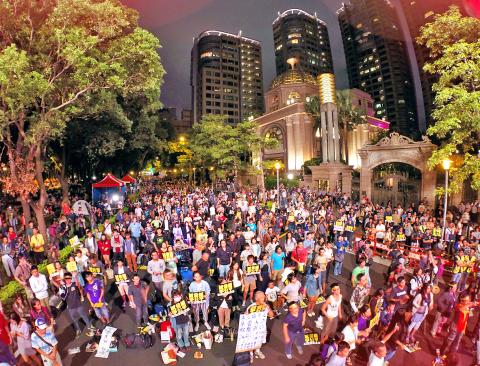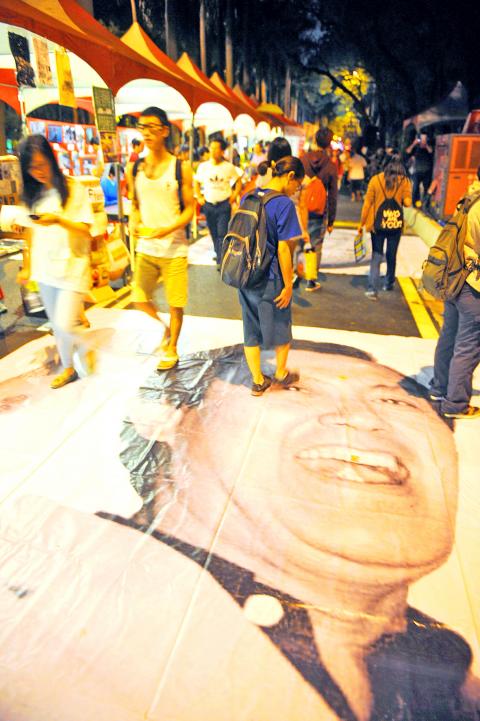Armed with tents and sleeping bags, thousands of protesters camped out overnight on Taipei’s Renai Road last night, in a massive “sleepout” launched by the Housing Movement (巢運) to protest what critics say are soaring housing prices and government inaction toward them.
Led by a coalition of more than 70 civic groups, the movement issued three demands: comprehensive reform of housing policies — including a major overhaul of the nation’s property tax system to curb speculative investment — the enactment of formal legislation to promote construction of public housing; and the protection of housing rights against the interests of land expropriation projects.
According to the organizers, about 10,000 people turned out to participate in the protest, which also paid tribute to the landmark Snails Without Shells movement, a sleepout held on Aug. 26, 1989, against unaffordable housing, which saw more than 50,000 protesters camp out overnight on the city’s Zhongxiao E Road.

Photo: Lo Pei-der, Taipei Times
Despite sporadic drizzle, yesterday’s demonstrations went on undeterred, starting with a rally at the site of the Snails Without Shells’ camp 25 years ago.
Lee Hsing-chang (李幸長), who described himself as an “old snail” who led the 1989 movement, led a procession from Zhongxiao E Road toward the Renai Road protest site.
Protesters congregated on the pavement in front of The Palace (帝寶) luxury residential complex, which is widely recognized as the most expensive piece of real-estate in the nation. Rows of small tents and sleeping bags lined the road’s leafy median islands, accompanied by stands promoting the ideas of the participating civic advocacy groups.

Photo: Wang Min-wei, Taipei Times
At one point, protesters lay down on the pavement to express their discontent, while raising their cellphones in unison to “light up the darkness.”
The protesters spent the night chanting slogans such as “Destroy cronyism, strive for fairness” and “Give me housing rights, make housing affordable,” while activist musicians gave live performances throughout the night.
The crowd was galvanized by guest appearances from prominent activists, including Taiwan Labor Front secretary-general Son Yu-liam (孫友聯), Sunflower movement leader Chen Wei-ting (陳為廷) and human rights lawyer Lai Chung-chiang (賴中強). Representatives from various communities threatened by forced evacuation for development projects also showed up to express their solidarity with the movement.
“Our current administration can pass a cross-strait service trade agreement within 30 seconds, but chooses to do nothing about housing prices for 25 years,” said Peng Yang-kai (彭揚凱), one of the Housing Movement leaders.
A diverse range of people made up the crowd that camped out overnight on the grass among the rows of trees on the road’s median islands.
Chu Yucheng (朱育成), a high-tech industry employee in his 20s, said he supports the movement’s demands, especially on tax reform and public housing. He said he came with several friends, and they made themselves comfortable spreading out sheets of cardboard on the grass around their sleeping bags. Some of the other “campers” came with their entire family.
Housing prices in Taipei have reached an average of NT$675,000 per ping (US$6, 695 per square meter), meaning that the average apartment costs 15.01 times the average annual household income, statistics from the Ministry of the Interior show. Real-estate prices have about tripled since 2001, while wages have stagnated for the vast majority of the workforce.
Comparative statistics show Taipei is leading the world in terms of the cost of housing. According to a report from US-based consulting company Demographia, Hong Kong’s housing prices were 14.9 times the average income, with Vancouver and San Francisco following at 10.3 and 9.2 times respectively.
Critics have lambasted the government for its perceived inaction in reforming the nation’s property tax system. Property taxes are based on land value assessments conducted by local governments, which typically amount to less than half of a transaction’s actual price. The system is said to encourage opportunistic investment
In response to the Housing Movement’s demands, ministry officials reiterated government plans to increase the number of public housing units to 34,000. Yet critics say that proposal is equivalent to just 0.4 percent of housing nationwide, a figure that falls far short of the international public housing standard of 5 percent.
Earlier yesterday, Democratic Progressive Party (DDP) Chairperson Tsai Ing-wen (蔡英文) commented on the issue on Facebook, saying: “Housing should be a right people have as they pursue happiness; it should not become a burden.”
Former DPP chairman Su Tseng-chang (蘇貞昌) also took to Facebook to show his support.
“A house is a home, not a piece of merchandise. Housing is a right that the government should protect,” Su said. “A housing policy should allow everyone to have a home, to live with quality and dignity.”
He added that the government should intervene to keep housing prices reasonable, push for a better rental market so that idle houses could become homes and strive to provide more public housing.
Additional reporting by Loa Iok-sin

Right-wing political scientist Laura Fernandez on Sunday won Costa Rica’s presidential election by a landslide, after promising to crack down on rising violence linked to the cocaine trade. Fernandez’s nearest rival, economist Alvaro Ramos, conceded defeat as results showed the ruling party far exceeding the threshold of 40 percent needed to avoid a runoff. With 94 percent of polling stations counted, the political heir of outgoing Costa Rican President Rodrigo Chaves had captured 48.3 percent of the vote compared with Ramos’ 33.4 percent, the Supreme Electoral Tribunal said. As soon as the first results were announced, members of Fernandez’s Sovereign People’s Party

MORE RESPONSIBILITY: Draftees would be expected to fight alongside professional soldiers, likely requiring the transformation of some training brigades into combat units The armed forces are to start incorporating new conscripts into combined arms brigades this year to enhance combat readiness, the Executive Yuan’s latest policy report said. The new policy would affect Taiwanese men entering the military for their compulsory service, which was extended to one year under reforms by then-president Tsai Ing-wen (蔡英文) in 2022. The conscripts would be trained to operate machine guns, uncrewed aerial vehicles, anti-tank guided missile launchers and Stinger air defense systems, the report said, adding that the basic training would be lengthened to eight weeks. After basic training, conscripts would be sorted into infantry battalions that would take

GROWING AMBITIONS: The scale and tempo of the operations show that the Strait has become the core theater for China to expand its security interests, the report said Chinese military aircraft incursions around Taiwan have surged nearly 15-fold over the past five years, according to a report released yesterday by the Democratic Progressive Party’s (DPP) Department of China Affairs. Sorties in the Taiwan Strait were previously irregular, totaling 380 in 2020, but have since evolved into routine operations, the report showed. “This demonstrates that the Taiwan Strait has become both the starting point and testing ground for Beijing’s expansionist ambitions,” it said. Driven by military expansionism, China is systematically pursuing actions aimed at altering the regional “status quo,” the department said, adding that Taiwan represents the most critical link in China’s

‘REALLY PROUD’: Nvidia would not be possible without Taiwan, Huang said, adding that TSMC would be increasing its capacity by 100 percent Nvidia Corp CEO Jensen Huang (黃仁勳) on Saturday praised and lightly cajoled his major Taiwanese suppliers to produce more to help power strong demand for artificial intelligence (AI), capping a visit to the country of his birth, where he has been mobbed by adoring fans at every step. Speaking at an impromptu press conference in the rain outside a Taipei restaurant, where he had hosted suppliers for a “trillion-dollar dinner,” named after the market capitalization of those firms attending, Huang said this would be another good year for business. “TSMC needs to work very hard this year because I need a lot